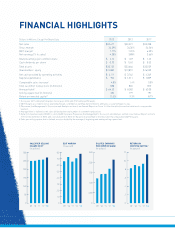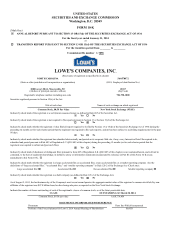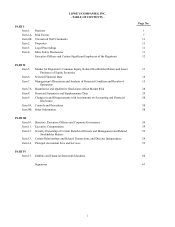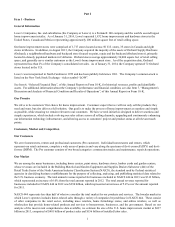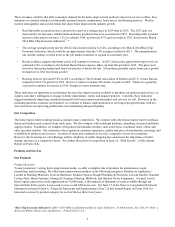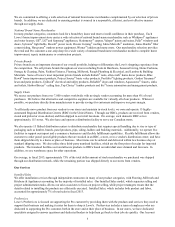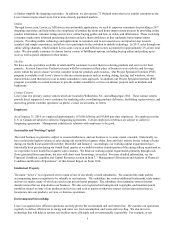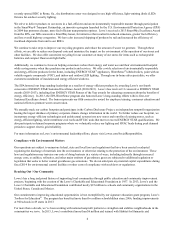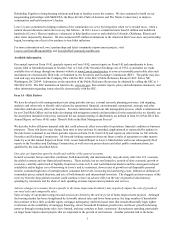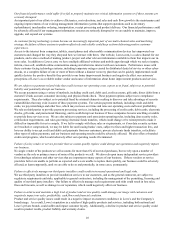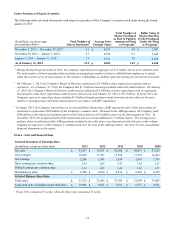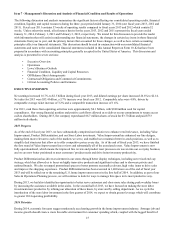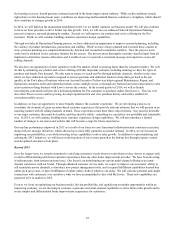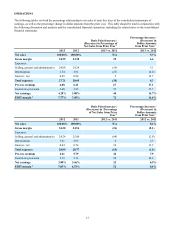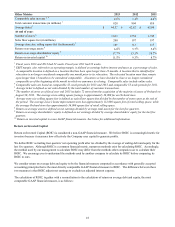Lowe's 2013 Annual Report Download - page 16
Download and view the complete annual report
Please find page 16 of the 2013 Lowe's annual report below. You can navigate through the pages in the report by either clicking on the pages listed below, or by using the keyword search tool below to find specific information within the annual report.8
improvement industry is the possibility that interest rates will rise as the Federal Reserve System follows through in 2014 and
2015 on its announced plans to gradually withdraw the economic stimulus provided in recent years.
Changes in existing or new laws and regulations or regulatory enforcement priorities could adversely affect our business.
Laws and regulations at the local, regional, state, federal and international levels change frequently, and the changes can impose
significant costs and other burdens of compliance on our business and our vendors. Any changes in regulations, the imposition
of additional regulations, or the enactment of any new legislation that affect employment/labor, trade, product safety,
transportation/logistics, energy costs, health care, cyber-security, tax or environmental issues, could have an adverse impact,
directly or indirectly, on our financial condition and results of operations. Changes in enforcement priorities by governmental
agencies charged with enforcing existing laws and regulations can increase our cost of doing business. In addition, our
contracts with U.S., as well as state and local government entities, are subject to various procurement regulations and other
requirements, including audits and investigations, relating to their formation, administration, and performance, and we may be
adversely affected by changes in the regulations or negative findings from audits or investigations.
Our business and our reputation could be adversely affected by the failure to protect sensitive customer, employee, vendor or
Company information or to comply with evolving regulations relating to our obligation to protect our systems and assets and
such information from the threat of cyber-attacks.
Cyber-attacks designed to gain access to sensitive information by breaching mission critical systems of large organizations are
constantly evolving, and high profile electronic security breaches leading to unauthorized release of sensitive customer
information have occurred recently at a number of major U.S. companies, including several large retailers, despite widespread
recognition of the cyber-attack threat and improved data protection methods. While we have invested in the protection of our
information technology and maintain what we believe are adequate security procedures and controls over the Company’s
records and intellectual property, in addition to financial and other individually identifiable customer, employee and vendor
data provided to us, a breach in our systems that results in the unauthorized release of sensitive data could nonetheless occur
and have a material adverse effect on our reputation, drive customers away and lead to financial losses from remedial actions,
or potential liability, including possible punitive damages. An electronic security breach resulting in the unauthorized release
of sensitive data from our information systems could also materially increase the costs we already incur to protect against such
risks. In addition, as the regulatory environment relating to retailers and other companies' obligation to protect such sensitive
data becomes stricter, a material failure on our part to comply with applicable regulations could subject us to fines or other
regulatory sanctions and potentially to lawsuits.
We have many competitors who could take sales and market share from us if we fail to execute our merchandising, marketing
and distribution strategies effectively.
We operate in a highly competitive market for home improvement products and services and have numerous large and small,
direct and indirect competitors. The competitive environment in which we operate is particularly challenging during periods of
slower economic growth and higher unemployment. The principal competitive factors in our industry include location of
stores, customer service, quality and price of merchandise and services, in-stock levels, and merchandise assortment and
presentation. Our failure to respond effectively to competitive pressures and changes in the markets for home improvement
products and services could affect our financial performance. Moreover, changes in the promotional pricing and other practices
of our competitors, including the effects of competitor liquidation activities, may impact our results.
Our inability to effectively manage our relationships with selected suppliers of brand name products could negatively impact
our business plan and financial results.
We form strategic relationships with selected suppliers to market and develop products under a variety of recognized and
respected national brand names. The inability to effectively and efficiently manage and maintain the relationships with these
suppliers could negatively impact our business plan and financial results.
Operating internationally presents unique challenges that have required us to adapt our store operations, merchandising,
marketing and distribution functions to serve customers in Canada and Mexico and to work effectively with our joint venture
partner in Australia.
A significant portion of our anticipated store growth over the next five years will be in Canada and Mexico. We are also in a
joint venture with Australia’s largest retailer, Woolworths Limited, to develop a network of home improvement stores for
consumers in Australia. Expanding internationally presents unique challenges that may increase the anticipated costs and risks,
and slow the anticipated rate, of such expansion.


